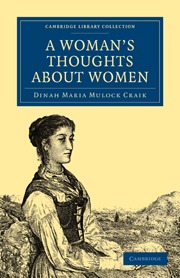Book contents
- Frontmatter
- PREFACE
- Contents
- CHAP. I SOMETHING TO DO
- CHAP. II SELF-DEPENDENCE
- CHAP. III FEMALE PROFESSIONS
- CHAP. IV FEMALE HANDICRAFTS
- CHAP. V FEMALE SERVANTS
- CHAP. VI THE MISTRESS OF A FAMILY
- CHAP. VII FEMALE FRIENDSHIPS
- CHAP. VIII GOSSIP
- CHAP. IX WOMEN OF THE WORLD
- CHAP. X HAPPY AND UNHAPPY WOMEN
- CHAP. XI LOST WOMEN
- CHAP. XII WOMEN GROWING OLD
CHAP. IX - WOMEN OF THE WORLD
Published online by Cambridge University Press: 05 August 2011
- Frontmatter
- PREFACE
- Contents
- CHAP. I SOMETHING TO DO
- CHAP. II SELF-DEPENDENCE
- CHAP. III FEMALE PROFESSIONS
- CHAP. IV FEMALE HANDICRAFTS
- CHAP. V FEMALE SERVANTS
- CHAP. VI THE MISTRESS OF A FAMILY
- CHAP. VII FEMALE FRIENDSHIPS
- CHAP. VIII GOSSIP
- CHAP. IX WOMEN OF THE WORLD
- CHAP. X HAPPY AND UNHAPPY WOMEN
- CHAP. XI LOST WOMEN
- CHAP. XII WOMEN GROWING OLD
Summary
The world! It is a word capable of as diverse interpretations or misinterpretations as the thing itself—a thing by various people supposed to belong to heaven, man, or the devil, or alternately to all three. But this is not the place to argue the pros and cons of that doctrinal theology which views as totally evil the same world which its Creator pronounced to be “very good,” the same world in and for which its Redeemer lived as well as died; nor, taking it at its present worst, a sinful, miserable, mysterious, yet neither wholly comfortless, hopeless, nor godless world, shall I refer further to that strange Manichæanism which believes that anything earth possesses of good can have sprung from any other source than the All-good, that any happiness in it could exist for a moment, unless derived from Infinite Perfection.
“A woman of the world”—“Quite a woman of the world”;—“A mere woman of the world”—with how many modifications of tone and emphasis do we hear the phrase; which seems inherently to imply a contradiction. Nature herself has apparently decided for women, physically as well as mentally, that their natural destiny should be not of the world. In the earlier ages of Judaism and Islamism, nobody ever seems to have ventured a doubt of this. Christianity alone raised the woman to her rightful and original place, as man's one help-meet, bone of his bone and flesh of his flesh, his equal in all points of vital moment, yet made suited to him by an harmonious something which is less inferiority than difference.
- Type
- Chapter
- Information
- A Woman's Thoughts about Women , pp. 219 - 253Publisher: Cambridge University PressPrint publication year: 2010First published in: 1858



